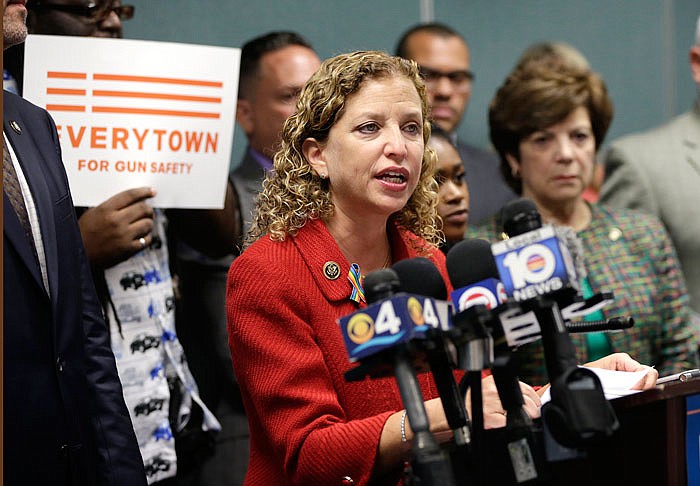PHILADELPHIA (AP) - On the heels of a tumultuous Republican convention, Hillary Clinton arrives in Philadelphia eager to show off a forward-looking Democratic Party united behind her steady leadership. To do that, she must overcome lingering bitterness among supporters of defeated rival Bernie Sanders and clean up a resurgent political mess of the party's own making.
The resignation of Debbie Wasserman Schultz as chairwoman of the Democratic National Committee made for a rocky start on Sunday, as the Florida congresswoman heeded Sanders' longstanding call to leave as party chief. Her departure comes a few days after the publication of 19,000 hacked emails, which Sanders said confirmed his belief the national party played favorites for Clinton during the primary.
"The party now needs new leadership that will open the doors of the party and welcome in working people and young people," Sanders said.
Wasserman Schultz's abrupt departure was undoubtedly an effort to keep the Democrats' gathering from devolving into the tumult that marred last week's GOP meeting, when runner-up Ted Cruz pointedly and publicly refused to endorse nominee Donald Trump. As he demanded Wasserman Schultz's resignation, Sanders made clear he wants to see Clinton in the White House.
"I'm going to do everything I can to defeat him, to elect Hillary Clinton and to keep focusing, keep focusing on the real issues facing the American people," Sanders said on CNN.
Clinton and President Barack Obama both quickly praised the departed party chief, hoping to move past the ugliness and onto today's launch of an optimistic celebration featuring high-powered elected officials and celebrities who will try to re-introduce Clinton to a general election audience.
The cache of more than 19,000 emails from Democratic party official details the acrimonious split between the Democratic National Committee and Sanders.
Several emails posted by Wikileaks on its document disclosure website show DNC officials scoffing at Sanders and his supporters and in one instance, questioning his commitment to his Jewish religion. Some emails also show DNC and White House officials mulling whether to invite guests with controversial backgrounds to Democratic party events.
On its web page, Wikileaks said the new cache of emails came from the accounts of "seven key figures in the DNC" and warned the release was "part one of our new Hillary Leaks series" - an indication more material might be published soon. Among the officials whose emails were made public were DNC spokesman Luis Miranda, national finance director Jordon Kaplan and finance chief Scott Comer, but other DNC and media figures and even some White House officials communicated with them between January 2015 and last May, Wikileaks said.
Never one to miss an opportunity to poke at his rivals, Trump appeared to relish the Democratic chaos Sunday, writing on Twitter: "The Dems Convention is cracking up." His campaign chief, Paul Manafort, went further and called on Clinton to drop out of the race altogether.
Sanders will address the convention tonight, and Obama will speak on Wednesday night. Other high-profile speakers include first lady Michelle Obama, former President Bill Clinton and Vice President Joe Biden.
They will try to overcome party disunity that seems certain to also be a factor in Philadelphia, given Wasserman Schultz's departure and the general unhappiness among many Sanders supporters intensified by both the emails and by Clinton's pick of Sen. Tim Kaine of Virginia to be her running mate.
"If they think they can win without half the party, let them lose," said Andrew Fader, 27, of New York, who was wearing a "Bernie" T-shirt on Sunday near the Liberty Bell. "And I'll move to Canada."
Norman Solomon, a delegate who supports Sanders, said Wasserman Schultz's removal was unlikely to soothe those who back the Vermont senator. He said there is talk among Sanders' delegates of walking out during Kaine's acceptance speech or turning their backs as a show of protest. Sanders' supporters believe Kaine is not liberal enough.
Sanders endorsed Clinton two weeks ago after pressing for the party platform to include a $15-an-hour minimum wage, debt-free college and an expansion of access to health care.
Liberal Sanders supporters pushed for changes to the party nominating process at a meeting of the convention rules committee Saturday. They did not succeed in passing an amendment abolishing superdelegates, but they did win a compromise deal with the Clinton camp - a "unity commission" that will review the overall procedures and will seek to limit the role of superdelegates in future elections.
Clinton's campaign manager, Robby Mook, tried to shift blame for the email hack away from DNC officials and onto "Russian state actors" who, he said, may have breached DNC computers "for the purpose of helping Donald Trump," the Republican presidential nominee.
How the emails were stolen hasn't been confirmed.
Party wrangles aside, Clinton is within just days of her long-held ambition to become the party's official presidential nominee.
After the DNC released a slightly trimmed list of superdelegates - those are the party officials who can back any candidate - it now takes 2,382 delegates to formally clinch the nomination. Clinton has 2,814 when including superdelegates, according to an Associated Press count. Sanders has 1,893.

